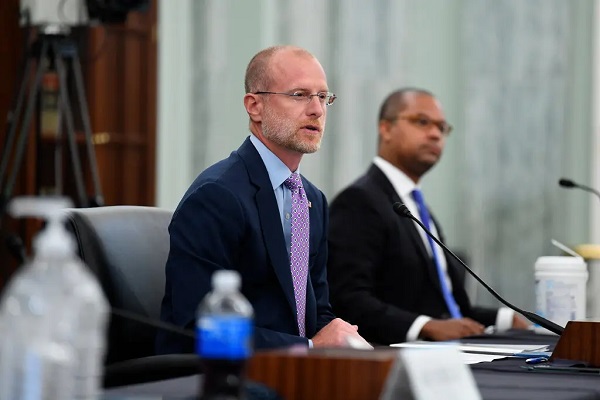Ad Blocker Detected
Our website is made possible by displaying online advertisements to our visitors. Please consider supporting us by disabling your ad blocker.
Brendan Carr is chosen by Trump to lead the FCC
Mr. Carr, a prominent opponent of Big Tech and current commission member, has stated that the body needs to regulate the tech sector.

On Sunday, President-elect Donald J. Trump named Brendan Carr chairman of the Federal Communications Commission. The next administration’s promises to cut regulation, target Big Tech, and punish TV networks for their political bias have been publicly endorsed by Carr, a seasoned Republican regulator.
Mr. Carr, who currently sits on the commission, is expected to overthrow a somewhat unremarkable agency that regulates phone rates, licenses television and radio frequencies, and promotes the growth of home internet. Mr. Trump made it apparent before the election that he wanted the agency to cancel the licenses of media outlets such as CBS and NBC for their biased coverage.
Wrote a chapter on the FCC and discussed that the agency should regulate the largest tech companies, such as Apple, Meta, Google, and Microsoft, in the conservative Project 2025 planning paper.
According to Mr. Carr’s post on X last week, “The censorship cartel must be dismantled.”
Telecom attorneys and analysts say Mr. Carr has the ability to radically change the independent agency, expanding its scope and utilizing it as a right-wing political instrument. According to their forecasts, Mr. Carr would strive to regulate corporations like Meta and Google, stretching the agency’s authority to the legal limit and beginning a protracted fight with Silicon Valley.
According to Jessica Gonzalez, co-chief executive of the nonpartisan public interest organization Free Press, Mr. Carr has “proposed to do a lot of things he has no jurisdiction to do and in other cases he’s blatantly misreading the rules.”
Brendan Carr is chosen by Trump to lead the FCC
In a statement, President Trump said, “Commissioner Carr is a warrior for free speech and has fought against the regulatory lawfare that has stifled Americans’ freedoms and held back our economy.”
Mr. Carr did not immediately respond to a request for comment.
Mr. Carr will not be free to make changes as he pleases. The Federal Trade Commission and the Department of Justice have taken on the biggest roles in tech regulation, primarily through the enforcement of antitrust charges and consumer protection laws.
According to legal experts, new legislation would likely be needed to expand the FCC’s regulatory authority over companies like Google and Meta that are not considered communications services because Congress controls the agency’s budget. The commission would consist of three Republicans and two Democrats under the Trump administration.
The FCC is likewise prohibited from punishing radio and television stations for editorial decisions, save in cases of obscenity and violations of children’s television laws.
However, the experts are cautioned, Mr. Carr might exert pressure on businesses by using the agency’s bully pulpit. In addition, he might look into regulatory violations that could lead to fines or license revocation or threaten to stop mergers.
Blair Levin, a former FCC chief of staff and policy adviser for the New Street investment research firm, said that Brendan is “by far the most talented politician on the commission right now.” “What he can do with the powers the FCC currently has, however, is the real question.”
Also Read: Trump Reexamines Treasury Secretary
Mr. Carr, who practices telecommunications law, earned his legal degree from the Catholic University of Washington. He joined the FCC as a legal adviser in 2012 and was elevated to general counsel five years later.
In 2017, Mr. Trump appointed him to one of the Republican seats on the panel. Mr. Carr focused on promoting high-speed wireless internet because it was still being deployed in rural regions. He also supported Republican Chairman Ajit Pai’s efforts to remove regulations such as net neutrality, which are categorized internet service providers as utilities for regulatory purposes. The Democratic-controlled FCC reintroduced the rules earlier this year, and they are currently being challenged in court.
In a statement following the election, Mr. Carr stated, “The FCC will have a significant role to play when the transition is complete, reining in Big Tech, ensuring that broadcasters operate in the public interest, and unleashing economic growth while advancing our national security interests and supporting law enforcement.”
Additionally, Mr. Carr has sided with Elon Musk, the billionaire businessman and close friend of the president-elect.
The FCC’s Rural Digital Opportunity Fund awarded a $885 million grant to Mr. Musk’s Starlink satellite internet provider in late 2020. This money allows internet service providers to provide high-speed internet to rural homes and businesses.
However, the FCC, which is governed by Democrats, canceled that funding in 2022 because Starlink was unable to demonstrate that it would adequately serve rural houses without internet access and did not meet speed standards.
Mr. Carr strongly disagreed with the ruling, claiming in a statement that Mr. Musk was singled out by the Biden administration.
“It was, in my opinion, nothing more than regulatory lawfare against one of the left’s main targets: Mr. Musk,” Mr. Carr stated in a Wall Street Journal editorial piece last month.

